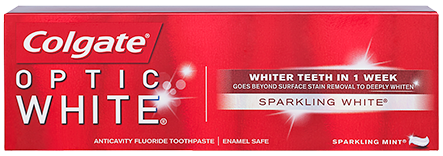 Top Class Action Lawsuits
Top Class Action Lawsuits
Show us your Pearly Whites, Darling. Oh, is your tube of Colgate Optic White Toothpaste just not cutting it? Teeth aren’t gleaming white as advertised? Well, you’re not alone. This week, Lori Canale, filed a consumer fraud class action lawsuit against the company alleging—you guessed it—consumer fraud.
Specifically, Canale claims in the Colgate toothpaste lawsuit, for herself and for all others similarly situated, that Colgate-Palmolive misrepresents that its Colgate Optic White Toothpaste “Goes beyond surface stain removal to deeply whiten” teeth and that its Colgate optic white platinum toothpaste “Deeply whitens more than three shades.” Which three shades, precisely?
According to the complaint, the toothpastes do not actually go beyond surface stain removal and do not deeply whiten teeth because their whitening ingredient, which is 1 percent hydrogen peroxide, is not a large enough amount of hydrogen peroxide. Further, the product is not in contact with teeth for a long enough time to do what the company claims it does.
The case is US District Court for the Southern District of New York Case number 7:16-CV-03308-CS.
Lights out for Subaru? Well, likely not. But they are facing a defective automotive class action lawsuit filed in California this week, alleging certain of its vehicles contain a design defect making those vehicles unsafe for drivers and passengers.
Filed by Kathleen O’Neill of Pismo Beach, California, individually and for all others similarly situated, against Subaru of America Inc., the Subaru lawsuit asserts that the car maker’s 2010 and 2011 Subaru Outback vehicles contain a design and/or manufacturing defect that causes the exterior lighting bulbs to fail prematurely and frequently.
Further, this alleged defect, in addition to the associated safety issues, results in vehicle owners paying more to replace the exterior bulbs. Yes, that could get seriously annoying in addition to expensive.
The complaint alleges breach of implied warranty, violation of the Magnuson-Moss Warranty Act, unjust enrichment, and violations of California’s Consumer Legal Remedies Act and its Unfair Competition Law.
The case is US District Court for the Central District of California Western Division Case number 2:16-CV-02774-R-KS.
Top Settlements
Anti-trust at 30,000 Feet… Air New Zealand down under has agreed to come up with $35 million as settlement of their share of a class action lawsuit brought in 2006 by several freight forwarders who allege the airline fixed prices in their cargo operations. FYI—Air New Zealand is just one defendant in the antitrust class action lawsuit.
Although the airline has not admitted liability, it has agreed to settle to mitigate further legal action and related court costs.
The class action named a list of global airlines, alleging that they conspired on cargo fuel and security surcharges between 2000 and 2006. The US class action is just one of several similar cases brought in other countries. The US Department of Justice launched a criminal investigation, from which Air New Zealand was released in 2011.
The settlement remains subject to court approval. The $35 million represents 2.8% of the $1.2 billion so far paid in settlements by 28 airlines accused of price-fixing. Hey—money in money out—right?
Ok –That’s a wrap folks…Have a good one. See you at the Bar!









